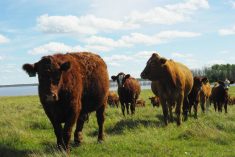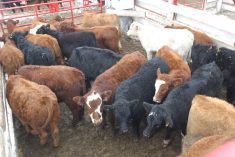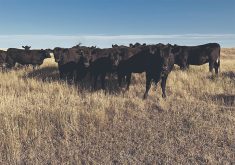DRUMHELLER, Alta. – A controversial law that changes grazing lease policy has been approved by the Alberta legislature just before it adjourned for summer.
The Agricultural Dispositions Statutes Amendment Act, Bill 31, will not become law until regulations have been written this summer and fall, said Tom Thurber, who led a government committee to examine grazing lease policies.
“I don’t know if you ever meet everyone’s concerns,” said Thurber.
The government plans to meet with the cattle industry and environmental groups, as well as oil and gas company representatives to develop regulations.
Read Also

Beef check-off collection system aligns across the country
A single and aligned check-off collection system based on where producers live makes the system equal said Chad Ross, Saskatchewan Cattle Association chair.
Ranchers complained the bill was passed too quickly, which Thurber denies.
“Everybody has known we were planning it for this spring’s legislation. You have to get something done rather than leave the uncertainty of it,” he said.
Passage of the bill was enough to draw 300 angry leaseholders to this central Alberta town May 19, where the western premiers conference was being held.
More than 60 people on horseback lined the driveway of the Royal Tyrell Museum to demonstrate their dissatisfaction with the bill to Alberta premier Ralph Klein. The premier did not appear and the protesters left.
Alberta’s grazing policy was last revised in 1941. Ranchers said they were satisfied with the current bill and this new legislation has upended them.
The government said it will collect compensation that oil companies pay for operating on leased land and place it in a conservation fund, rather than leaseholders receiving the money directly, as is now the case. This shift was prompted by concerns over leaseholders who receive more in compensation than they pay in rent.
Leaseholders receive about $40 million in yearly compensation and pay about $3.5 million in rent.
The leaseholders suggested a special formula to cap high payments but Thurber said government lawyers found the proposal unworkable.
Other parts of the act are acceptable to many leaseholders.
“Certainly there is no balance in this Bill 31,” said Jack Horner. A federal MP from 1958 to 1979, Horner was not impressed with how the government handled this bill.
He ranches at Pollockville in southeastern Alberta and said he has faced problems with oil companies. He said he has had an oil spill on his leased land and animals had to be destroyed when they were hurt near well sites.
The Alberta Grazing Leaseholders Association met frequently with the government and asked it to leave the compensation provisions alone.
At present, private landowners receive $500 for a right-of-entry fee by an oil company. They also get money for adverse affects.
The government does not charge a $500 entry fee for crown lands, which Horner suggests it should, and then it could leave the compensation alone.
Canadian 88 Energy president Greg Noval said his company does not favor the bill.
By paying compensation to the government, lessees may demand side deals and other agreements to cover adverse effects to the land or animals, he said.
“I’m going to have little deals, side deals and I’m going to be paying double. It’s going to create real chaos and a lot of hard feelings. It’s not necessary.”
A spokesperson for the Canadian Association of Public Landsmen said leaseholders are apt to be less co-operative if they do not receive compensation and may expect extra money above what the government is paid.
“The industry is concerned it will have to pay the same amount of money plus more,” said Glenn Kruyssen of CAPL.
“As far as CAPL sees it, we take full responsibility for actual damages,” he said.
The money traditionally paid to leaseholders for adverse effects should go to the government so all members of the public can benefit. In turn the government can reward leaseholders for keeping land in good condition, he said.

















